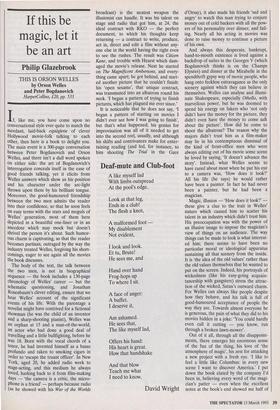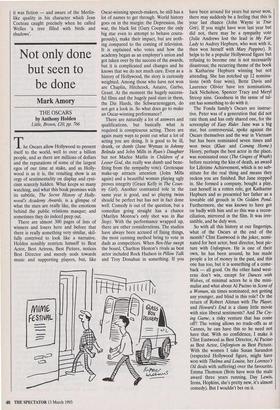If this be magic, let it be an art
Philip Glazebrook
THIS IS ORSON WELLES by Orson Welles and Peter Bogdanovich HarperCollins, £20, pp. 533 If, like me, you have come upon no conversational style ever quite to match the Mordant, laid-back espieglerie of clever Hollywood movie-folk talking to each other, then here is a book to delight you. The main event is a 300-page conversation between Peter Bogdanovich and Orson Welles, and there isn't a dull word spoken on either side: the art of Bogdanovich's interrogation conceals itself in the ease of good friends talking, yet it elicits from Welles answers which show us his position and his character under the arc-light thrown upon them by his brilliant tongue. Moreover, the good-humoured friendship between the two men admits the reader into their confidence, so that he soon feels on easy terms with the stars and moguls of Welles' generation, most of them here depicted in a beautiful one-liner or in an anecdote which may mock but doesn't shrivel the person it's about. Such humor- ous charm is captivating, so that the reader becomes partisan, outraged by the way the industry treated Welles, forgiving his short- comings, eager to see again all the movies the book discusses.
The body of the text, the talk between the two men, is not in biographical sequence — the book includes a 130-page chronology of Welles' career — but the schematic questioning, and Jonathan Rosenbaum's clever editing, ensure that we hear Welles' account of the significant events of his life. With the parentage a novelist might have contrived for a fictional showman (he was the child of an inventor and a sharp-shooting pianist), Welles was an orphan at 15 and a man-of-the-world, an actor who had done a good deal of travelling and a little bullfighting, before he was 18. Born with the vocal chords of a tenor, he had invented himself as a basso profundo and taken to smoking cigars in order to 'escape the truant officer'. In New York, aged 20, he added radio work to stage-acting, and this medium he always loved, harking back to it from film-making days — 'the camera is a critic, the micro- phone is a friend' — perhaps because radio (as he showed with his War of the Worlds broadcast) is the neatest weapon the illusionist can handle. It was his talent on stage and radio that got him, at 24, the ideal contract with RKO — the perfect document, to which his thoughts keep returning — a contract to write, produce, act in, direct and edit a film without any- one else in the world having the right even to see the rushes. The result was Citizen Kane, and trouble with Hearst which dam- aged the movie's release. Next he started on The Magnificent Ambetsons, and every- thing came apart; he got behind, and start- ed another picture that he couldn't finish: his 'open sesame', that unique contract, was transmuted into an albatross round his neck. `I began a pattern of trying to finish pictures, which has plagued me ever since.'
It is noticeable that he does not say, 'I began a pattern of starting on movies I didn't ever see how I was going to finish', but that's what happened; his genius for improvisation was all of it needed to get into the second reel, usually, and although his shifts and contrivances make for enter- taining reading (and led, for instance, to him shooting The Trial in the Gare
Deaf-mute and Club-foot
A like myself lad With limbs outspread At the pool's edge.
Look at that leg, Ends in a club! The flesh a knot, A malformed foot My disablement Not evident, I look and look. Et tu, Brute!
He sees me, and Hand over hand Frog-hops up To where I sit.
A face of anger: A buffet.
I deserve it, Am ashamed. He sees that, The like myself lad, Offers his hand: His heart is great. How that handshake And that blow Teach me what I need to know.
David Wright
d'Orsay), it also made his friends 'sad and angry' to watch this man trying to conjure money out of cold backers with all the pow- ers of his personality over dinner, and fail- ing. Nearly all his acting in movies was done to raise money to continue a picture of his own.
And always this desperate, bankrupt, hand-to-mouth existence is lived against a backdrop of suites in the Georges V (which Bogdanovich thinks is on the Champs Elys6es) and dinner at the Mirabelle in the spendthrift gypsy way of movie people, who hang onto feckless extravagance as the only scenery against which they can believe in themselves. Welles can analyse and illumi- nate Shakespeare, especially Othello, with marvellous power, but he was doomed to spend his energy on fakers who 'not only didn't have the money for the picture, they didn't even have the money to come talk about the picture'. How did he come to shoot the albatross? The reason why the majors didn't trust him as a film-maker may lie in his contemptuous dismissal of the kind of front-office men who were always editing out of his movie some scene he loved by saying, 'It doesn't advance the story'. Instead, what Welles seems to have cared about most when he put his eye to a camera was, 'How does it look?' All his life (he says) he would rather have been a painter. In fact he had never been a painter, but he had been a magician.
Magic, illusion — 'How does it look?' these give a clue to the trait in Welles' nature which caused him to scatter his talent in an industry which didn't trust him. His preoccupation was with the power of an illusive image to impose the magician's view of things on an audience. The way things can be made to look is what interest- ed him; there seems to have been no particular moral or ideological apparatus sustaining all that scenery from the inside. It is 'the idea of the old values' rather than the old values themselves that he wanted to put on the screen. Indeed, his portrayals of wickedness (like his easy-going acquain- tanceship with gangsters) stress the attrac- tion of the wicked, Satan's outward charm. For Welles can always like people despite how they behave, and his talk is full of good-humoured acceptance of people the way they are. Towards almost everyone he is generous, the pain of what they did to his movies hidden in a joke: 'You could hardly even call it cutting — you know, run through a broken lawn-mower'.
Out of it all, through all the disappoint- ments, there emerges his enormous sense of the fun of the thing, his love of 'the atmosphere of magic', his zest for attacking a new project with a fresh eye. 'I like to feel a little like Columbus: in every new scene I want to discover America.' I put down the book elated by the company I'd been in, believing every word of the magi- cian's patter — even when the excellent notes at the book's end showed me half of it was fiction — and aware of the Merlin- like quality in his character which Jean Cocteau caught precisely when he called Welles 'a tree filled with birds and shadows'.



























































 Previous page
Previous page